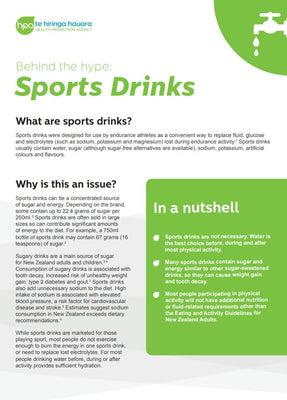Behind the hype: Sports drinks - NPA047

The two-page Behind the Hype information sheets contain evidence-based advice to help you provide clear consistent information to consumers. Are you confused about who needs sports drinks and when? This Behind the Hype information sheet takes the mystery out of using these beverages. You may be surprised to learn that very few people do enough exercise to need a sports drink.
The full resource:
In a nutshell
- Sports drinks are not necessary. Water is the best choice before, during and after most physical activity.
- Many sports drinks contain sugar and energy similar to other sugar-sweetened drinks, so they can cause weight gain and tooth decay.
- Most people participating in physical activity will not have additional nutrition or fluid-related requirements other than the Eating and Activity Guidelines for New Zealand Adults.
What are sports drinks?
Sports drinks were designed for use by endurance athletes as a convenient way to replace fluid, glucose and electrolytes (such as sodium, potassium and magnesium) lost during endurance activity 1. Sports drinks usually contain water, sugar (although sugar-free alternatives are available), sodium, potassium, artificial colours and flavours.
Why is this an issue?
Sports drinks can be a concentrated source of sugar and energy. Depending on the brand, some contain up to 22.4 grams of sugar per 250ml2. Sports drinks are often sold in large sizes so can contribute significant amounts of energy to the diet. For example, a 750ml bottle of sports drink may contain 67 grams (16 teaspoons) of sugar2.
Sugary drinks are a main source of sugar for New Zealand adults and children3,4. Consumption of sugary drinks is associated with tooth decay, increased risk of unhealthy weight gain, type 2 diabetes and gout3. Sports drinks also add unnecessary sodium to the diet. High intake of sodium is associated with elevated blood pressure, a risk factor for cardiovascular disease and stroke5. Estimates suggest sodium consumption in New Zealand exceeds dietary recommendations4.
While sports drinks are marketed for those playing sport, most people do not exercise enough to burn the energy in one sports drink, or need to replace lost electrolytes. For most people drinking water before, during or after activity provides sufficient hydration.
What is the best choice of drink for my activity?
Water is the best choice before, during and after most physical activities. Some examples are given below.
Activity |
Best drink choice? |
Advice |
|
15-year-old boy playing cricket – both fielding and batting |
Water |
Drink water regularly throughout the game. Although cricket games can last for several hours, the activity is not continuous or of high intensity. |
|
Gym session for about an hour – mix of cardio and weights (adult female) |
Water |
Drink water before, during and after the workout to replace fluid lost as sweat. |
|
3-hour bike ride (adult male) |
Water |
Drink water before, during and after to avoid dehydration. Even on a three-hour bike ride, sports drinks are not needed. Water provides sufficient hydration and regular snacks (such as bananas) can help meet energy requirements. |
|
Adult female running with friends – medium to fast pace for 40 minutes |
Water |
Drink water before and after the workout to replace fluid lost as sweat. |
|
Primary school-aged girl playing netball or rugby in the weekend for age-group rep team |
Water |
Drink water before, during (at half time) and after the game. |
|
Long, hot day at the beach and feeling really thirsty |
Water |
Drink water regularly throughout the day before you get thirsty. |
More information
The Eating and Activity guidelines
Healthy eating, active living has information on fluid intake
How much sugar are adults drinking?
How much sugar are children drinking?
References
- Burke I, Read S (1993). Dietary Supplements in sport. Sports Medicine 15(1) 43-65.
- The New Zealand Institute for Plant and Food Research Ltd and the Ministry of Health (2014). The Concise New Zealand Food Composition Tables, 10th Edition. Retrieved from www.foodcomposition.co.nz/concise-tables
- University of Otago and Ministry of Health (2011). A Focus on Nutrition: Key Findings of the 2008/09 New Zealand Adult Nutrition Survey. Wellington, Ministry of Health.
- Ministry of Health (2003). NZ Food NZ Children Key Results of the 2002 National Children’s Nutrition Survey Wellington Ministry of Health.
- National Health and Medical Research Council (2006). Nutrient Reference Values for Australia and New Zealand Including Recommended Dietary Intakes. Canberra, Department of Health and Ageing.
Code:NPA047